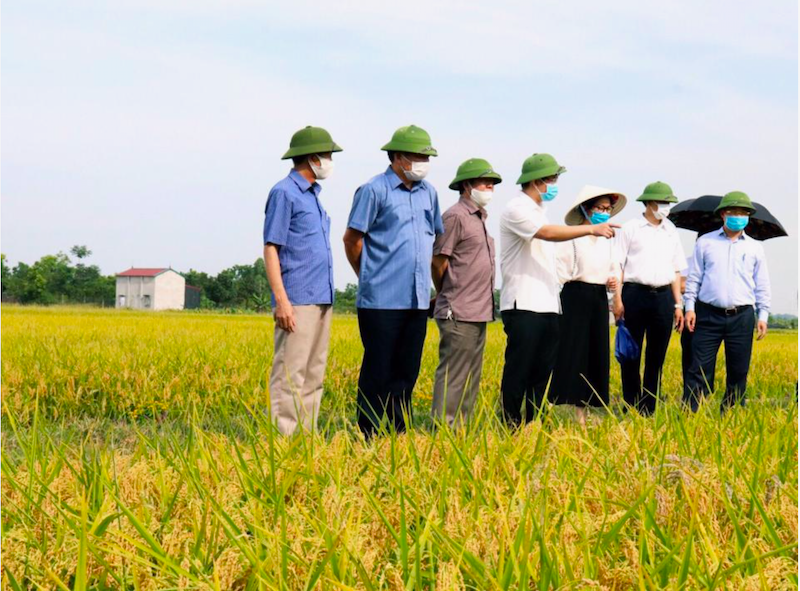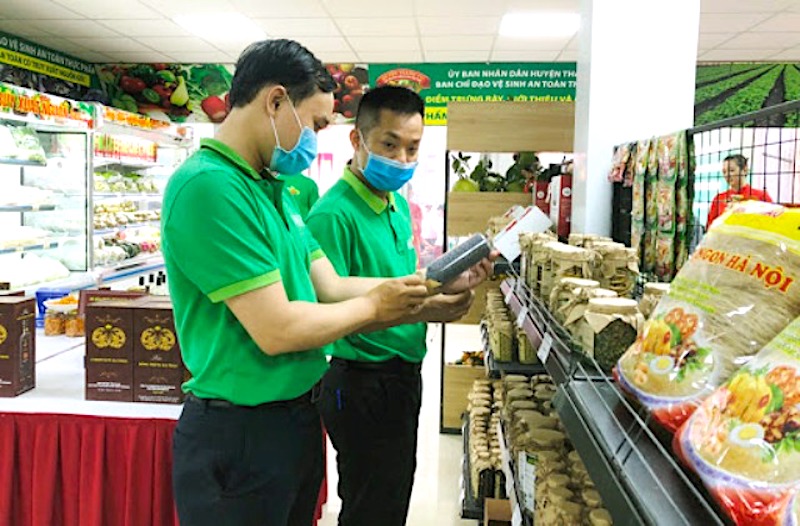Hanoi strives to find markets for farm produce and specialties
Hanoi will focus on developing linkages in agricultural production for key commodities in the coming time.
Recently, Hanoi has built high-value brands for many typical regional agricultural products, but sales of specialties and agricultural products remain sluggish.
| Dong Phu organic rice field in Chuong My District. Photo: Binh Minh/ The Hanoi Times |
Weakness in consumption
In Hanoi’s suburban district of Chuong My, Dong Phu organic rice was certified as a collective trademark by the National Office of Intellectual Property of Vietnam in 2015, Director of the Dong Phu Organic Agriculture Cooperative Trinh Thi Nguyet told The Hanoi Times.
Since then, Dong Phu organic rice has become popular and sells well in the domestic and foreign markets at prices three times higher than the time before it was certified. Under the brand, the cooperative has exported its rice to the EU and the US, the world’s biggest markets.
According to Nguyet, prices of organic rice are 1.6-1.7 times higher than other rice varieties, grossing revenue of up to VND25-26 million (US$1,068-1,111) per ha per crop. “This is the result of the collaboration between the cooperative with Green Path Vietnam Trading and Import-Export JSC over the years,” she said.
However, not many cooperatives have brand-name agricultural products and specialties and enjoy the stable output and high value as Dong Phu.
Chairwoman of the Vietnam Retailers Association Vu Thi Hau said the linkage among farmers, cooperatives that have branded products, and enterprises to form complete value chains from production to distribution is still weak.
“Many enterprises and cooperatives are still not actively participating in connection activities, who are weak in a management capacity and market development,” she added.
More supply-demand linking solutions
Although Hanoi's agricultural sector has implemented many solutions to promote connection for the sale of agricultural products, there are still many small-scale incomplete chain links.
For the chain of production, processing, and consumption of products to be efficiently promoted and make high added value, Chairman of the Hanoi Cooperative Alliance Do Huy Chien proposed that the city and localities create favorable conditions for cooperatives to get loans with preferential interest rates.
“This would help them expand production scale, participate in trade fairs, and strike deals with partners,” he told The Hanoi Times.
Hanoi has 141 chains from production to consumption of agricultural, forestry, and fishery products, as well as more than 7,000 agricultural products having been stamped with traceability codes. Besides, more than 1,600 products have been ranked by the city’s One Commune One Product (OCOP) program.
To replicate the models, Hanoi will focus on developing linkages in agricultural production for key commodities, according to the Hanoi Department of Agriculture and Rural Development.
The Department will focus on reviewing enterprises and cooperatives involved in the production and consumption of farm commodities, to guide the building of linkage chain meeting requirements.
Director of the Hanoi Department of Agriculture and Rural Development Chu Phu My emphasized they also advise the city to have mechanisms and policies to support the development of infrastructure, machinery and equipment, and processing factories.
| OCOP products are displayed in Thanh Tri District's store. Photo: Trong Tung/ The Hanoi Times |
In the coming time, the department will continue to focus on enhancing the production of agricultural products and local specialties associated with the OCOP program.
“Localities need to facilitate access to modern distribution channels of some products with specific potential for planning. They should invest in production, and supporting linkages in the value chain from production to preliminary processing, processing, and consumption,” he underlined.
In the long term, cooperatives and businesses need to continue to improve designs, packaging, quality, and traceability of origin. In particular, businesses need to build stable raw material areas and connect with retail businesses to establish distribution systems.
My also added that the Department will coordinate with the Trade Promotion Center for Agriculture under the Ministry of Agriculture and Rural Development to organize a fair connecting supply and demand in the value chain to sell agricultural products and regional specialties.
In addition, it is necessary to open training courses for participants in the chain link to improve their professional skills, promote the application of traceability information technology, and use QR codes to ensure product traceability and quality. As planned, Hanoi expected to complete its traceability system and integrate it into the national one by 2025.













